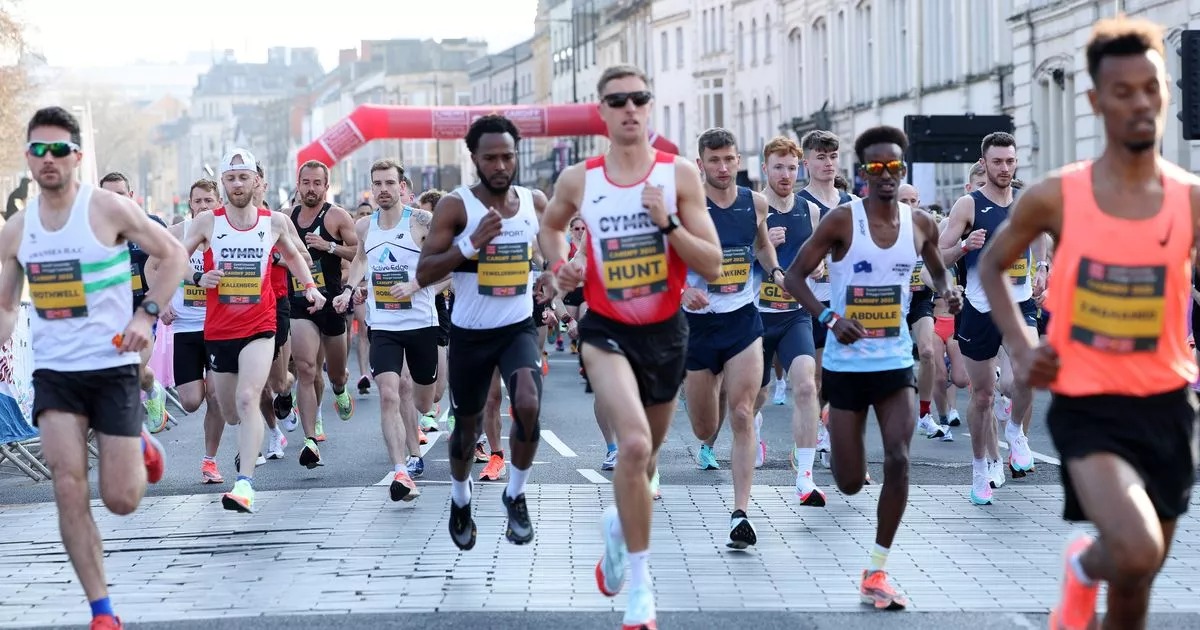

Featured
How Far Is A Mini Marathon
Modified: August 21, 2023
Discover how far a mini marathon is and get inspired to participate in this featured event. Explore the distance and challenge yourself to reach new fitness goals.
Introduction
Welcome to the exciting world of Mini Marathons! Whether you’re a seasoned runner or new to the sport, participating in a Mini Marathon can be a thrilling and rewarding experience. But what exactly is a Mini Marathon? In this article, we will explore the definition of a Mini Marathon, common distances for these events, training tips, and the many benefits of participating.
A Mini Marathon is a race that is shorter in distance compared to a full marathon. It is an excellent option for runners who may not feel ready to tackle the grueling 26.2 miles yet or those who prefer shorter races. The specific distance of a Mini Marathon can vary, but it typically falls in the range of 10 to 15 kilometers (6.2 to 9.3 miles). This makes it a perfect stepping stone for those looking to progress from a 5K or 10K race to a longer distance.
There are various reasons why someone might choose to participate in a Mini Marathon. Some are motivated by the challenge of pushing themselves to new limits, while others are drawn to the energetic atmosphere and sense of camaraderie that comes with participating in organized races. Mini Marathons also provide an opportunity to support charitable causes, with many events raising funds for important community initiatives.
If you’re considering participating in a Mini Marathon, training is key to ensure you’re prepared for the distance and intensity of the race. We will delve into effective training strategies in a later section, but it’s essential to gradually build up your endurance and incorporate both aerobic and strength training exercises. A well-rounded training plan will help you improve your cardiovascular fitness, increase your stamina, and reduce the risk of injuries.
Completing a Mini Marathon offers numerous benefits, both physical and mental. Engaging in regular exercise helps improve cardiovascular health, boosts the immune system, and reduces the risk of chronic diseases. Participating in races also provides a sense of accomplishment, boosts self-confidence, and cultivates discipline and perseverance. Not to mention the social aspect of connecting with other like-minded individuals and experiencing the joy and excitement of race day.
Whether you’re aiming for a personal best time or simply looking to challenge yourself, taking part in a Mini Marathon is a rewarding endeavor. In the following sections, we’ll provide you with valuable tips and training strategies to help you make the most of your Mini Marathon experience. So, lace up your running shoes, get ready to hit the pavement, and let’s dive into the world of Mini Marathons!
Definition of a Mini Marathon
A Mini Marathon is a race that falls under the category of long-distance running events. It is shorter in length compared to a full marathon, typically ranging from 10 to 15 kilometers (6.2 to 9.3 miles). The term “Mini Marathon” is often used interchangeably with other terms like “Half Marathon” or “Fun Run,” but it generally refers to a race that is shorter than the traditional 26.2-mile full marathon.
Mini Marathons are popular for several reasons. They provide an achievable distance for beginners and intermediate runners who are looking to challenge themselves without committing to the intense training required for a full marathon. Additionally, Mini Marathons are attractive to those who enjoy the race atmosphere and the excitement of crossing a finish line, but prefer a shorter duration and less physical strain than what a full marathon entails.
The specific distance of a Mini Marathon may vary from event to event, with some races opting for a 10-kilometer (6.2 miles) distance, while others go up to the 15-kilometer (9.3 miles) mark. These races often take place on well-marked routes through city streets, parks, or scenic areas, offering runners a chance to experience the local scenery and landmarks.
Mini Marathons are typically organized events, with participants required to register and pay an entry fee. The organizers often provide amenities to enhance the race experience, such as hydration stations, race bibs, timing chips, participant medals, and event t-shirts. These races often attract both competitive runners who aim to achieve a new personal best time and recreational runners who are simply looking to complete the distance and enjoy the experience.
It’s important to note that the term “Mini Marathon” can vary in different regions and contexts. Some events labeled as Mini Marathons may have shorter distances, such as 5 kilometers (3.1 miles) or 8 kilometers (4.97 miles), while still retaining the spirit of a long-distance running challenge. It’s always advisable to check the specific details of a race to ensure that the distance aligns with your goals and abilities.
Overall, a Mini Marathon is an exciting and accessible option for runners of all levels. It offers a chance to participate in a well-organized race, experience the thrill of crossing a finish line, and push personal limits without the commitment of a full marathon. Whether you’re a beginner looking to embark on your running journey or a seasoned runner seeking a shorter-distance challenge, the Mini Marathon provides the perfect blend of exhilaration and achievement.
Common Distances for Mini Marathons
Mini Marathons come in various distances, each providing its own unique challenge and appeal to runners. While the specific distance can vary from race to race, there are a few common distances that are typically associated with Mini Marathons.
The most common distance for a Mini Marathon is 10 kilometers (6.2 miles). This distance serves as a popular stepping stone for those who have completed 5K races and are ready to take on a slightly longer challenge. A 10K Mini Marathon is a great choice for runners seeking to improve their speed and endurance, as it requires a balance of aerobic fitness and endurance.
Another common distance for Mini Marathons is 15 kilometers (9.3 miles). This distance provides an additional challenge for runners who are looking to push themselves beyond the 10K mark. A 15K Mini Marathon allows runners to test their limits and build towards longer distance races, such as half marathons or even marathons.
Some Mini Marathons also offer unique distances that fall outside the standard 10K and 15K range. For example, there are races that offer 8 kilometers (4.97 miles) or 12 kilometers (7.46 miles) as their Mini Marathon distance. These alternative distances cater to runners who may be seeking a slightly shorter or longer challenge than the traditional options.
It’s important to note that the overall goal of a Mini Marathon is to provide runners with an achievable yet challenging race experience. The distances chosen for these events are designed to motivate and inspire participants to push themselves beyond their comfort zones while still enjoying the sense of accomplishment that comes with completing a race.
Whether you’re a beginner or an experienced runner, choosing the right Mini Marathon distance for you is crucial. Consider your current fitness level, training capabilities, and personal goals when deciding which distance to tackle. It’s always advisable to consult with a running coach or experienced runners for guidance and support in selecting the appropriate distance for your abilities.
As you prepare for your Mini Marathon, remember to gradually increase your training volume and intensity to adapt to the longer distances. Incorporate long runs, interval training, and strength exercises into your training plan to build endurance and improve your overall performance. By following a structured training regimen and selecting the right Mini Marathon distance, you’ll set yourself up for a successful and fulfilling race day experience.
Training for a Mini Marathon
Training is a crucial component of preparing for a Mini Marathon. It ensures that you have the strength, endurance, and mental stamina to tackle the distance and complete the race. Here are some key tips and strategies to consider when training for a Mini Marathon:
1. Develop a Training Plan: Start by creating a structured training plan that gradually increases your mileage and intensity over time. Aim for a mix of running workouts, including long runs, speed work, and recovery runs. Incorporate cross-training activities like strength training and yoga to improve overall fitness and prevent injuries.
2. Build Base Mileage: Begin by establishing a solid base mileage, which is the total distance you comfortably run each week. Gradually increase your mileage by about 10% each week to avoid overtraining and reduce the risk of injury.
3. Mix Up Your Workouts: Include a variety of running workouts in your training plan. Long runs improve endurance, speed work boosts your speed and aerobic capacity, and recovery runs help with active recovery and injury prevention.
4. Incorporate Strength Training: Don’t overlook the importance of strength training. Strengthening your core and lower body muscles will help with running stability and reduce the risk of injuries. Include exercises like squats, lunges, planks, and hip strengthening exercises in your routine.
5. Practice Speed Work: To improve your speed and anaerobic capacity, incorporate speed workouts like intervals, fartleks, and tempo runs into your training. These workouts will enhance your ability to sustain a faster pace during the Mini Marathon.
6. Allow for Adequate Rest and Recovery: Rest days are just as important as training days. Make sure to schedule regular rest days to allow your body to recover and prevent burnout. Listen to your body and don’t be afraid to take additional rest days if needed.
7. Gradually Increase Intensity: As your training progresses, gradually increase the intensity of your workouts. This can include adding more hills to your runs, increasing the speed and distance of your speed workouts, or incorporating longer runs into your training plan.
8. Practice Proper Nutrition and Hydration: Fuel your body with a well-balanced diet containing carbohydrates, protein, and healthy fats. Hydrate adequately before, during, and after your runs to maintain optimal performance and prevent dehydration.
9. Get Adequate Sleep: Sleep is essential for muscle recovery and overall health. Aim for 7-9 hours of quality sleep each night to support your training and maximize your performance.
Remember, everyone’s training needs are different. It’s important to listen to your body, adjust your training plan if necessary, and seek guidance from a running coach or experienced runners if you have specific goals or concerns. Stay committed, be consistent, and trust the training process. With proper training and preparation, you’ll be well-equipped to conquer your Mini Marathon with confidence!
Benefits of Participating in a Mini Marathon
Participating in a Mini Marathon offers numerous benefits beyond the satisfaction of crossing the finish line. Whether you’re an experienced runner or just starting your fitness journey, here are some key advantages of participating in a Mini Marathon:
1. Physical Fitness: Training for and participating in a Mini Marathon is an excellent way to improve your physical fitness. The consistent running and cross-training required for the race can help strengthen your cardiovascular system, increase endurance, and improve overall muscle tone and strength.
2. Weight Management: Regular training for a Mini Marathon can contribute to weight loss or weight management. Running burns calories and helps boost your metabolism, resulting in improved body composition and weight control.
3. Mental Well-being: Running has been proven to have a positive impact on mental health. Participating in a Mini Marathon helps reduce stress, boost mood, and improve overall mental well-being. The sense of accomplishment and the endorphin rush experienced during and after the race can have a profound effect on mental health and self-esteem.
4. Goal Achievement: Setting a goal to complete a Mini Marathon and following through with the training and preparation provides a sense of purpose and achievement. Crossing that finish line is a tangible reminder of the hard work, dedication, and perseverance put into training.
5. Community and Camaraderie: Participating in organized races like Mini Marathons allows you to connect with a community of like-minded individuals. You’ll have the opportunity to meet and interact with fellow runners, share stories, and inspire one another. The supportive and energetic atmosphere of race day creates a sense of camaraderie and motivation.
6. Charitable Contributions: Many Mini Marathons are organized as fundraising events for charitable causes. By participating, you have the opportunity to support a cause you care about and make a positive impact on your community. Knowing that your efforts are contributing to a greater good can provide an additional sense of fulfillment and purpose during the race.
7. Personal Growth and Discipline: Training for a Mini Marathon requires commitment, discipline, and perseverance. It pushes you out of your comfort zone and helps develop qualities like self-motivation, focus, and determination. The lessons learned from training and completing a Mini Marathon can be applied to other areas of life, leading to personal growth and a mindset of resilience.
8. Adventure and Exploration: Mini Marathons often take place in scenic locations, offering the opportunity to explore new routes and enjoy beautiful landscapes. Whether it’s running through city streets, parks, or along coastal paths, Mini Marathons provide a unique perspective and a chance to discover new places.
Remember, the benefits of participating in a Mini Marathon extend beyond race day. The physical, mental, and emotional rewards of the training process and the sense of accomplishment make it an experience worth pursuing. So, lace up your running shoes, embrace the challenge, and enjoy the many benefits that come with participating in a Mini Marathon!
Tips for Completing a Mini Marathon
Completing a Mini Marathon is a significant achievement that requires proper preparation and approach. Whether you’re a beginner or a seasoned runner, here are some essential tips to help you navigate the race and ensure a successful completion:
1. Set Realistic Goals: Determine your goals for the Mini Marathon, whether it’s completing the race within a certain time frame or simply finishing strong. Set realistic expectations based on your training, fitness level, and previous race experience.
2. Follow a Training Plan: Stick to a structured training plan leading up to the race. Gradually increase your mileage and intensity, and incorporate specific workouts to improve your speed, endurance, and overall fitness.
3. Pace Yourself: During the race, avoid starting too fast. Start with a comfortable pace and gradually pick up speed as you warm up. Conserving your energy in the early stages will help you maintain a steady and sustainable pace throughout the race.
4. Hydrate and Fuel Properly: Stay hydrated before, during, and after the Mini Marathon. Drink water or sports drinks at regular intervals to replenish fluids lost through sweat. Practice fueling strategies during your training runs to determine what works best for you on race day.
5. Dress Appropriately: Wear comfortable, moisture-wicking clothing and running shoes that have been broken in. Dress for the weather conditions on race day and use sunscreen to protect your skin.
6. Warm-Up and Cool Down: Prior to the race, warm up your muscles with dynamic stretches and a light jog. After the race, cool down with a gentle jog or walk followed by static stretching to release tight muscles and aid in recovery.
7. Mental Preparation: Stay focused and maintain a positive mindset throughout the race. Use visualization techniques to imagine yourself crossing the finish line and practice positive self-talk to stay motivated and overcome any obstacles along the way.
8. Listen to Your Body: Pay attention to any signs of fatigue or discomfort during the race. Don’t be afraid to slow down, take short walking breaks, or seek medical assistance if necessary. Your safety and well-being should always be a priority.
9. Enjoy the Experience: Remember to soak in the atmosphere and enjoy the journey. Cheer on your fellow runners, appreciate the support of volunteers and spectators, and take in the scenic views. A Mini Marathon is not just about the finish line but also about embracing the entire race day experience.
10. Post-Race Recovery: After completing the Mini Marathon, take time to rest and recover. Refuel with nutritious food, hydrate well, and engage in gentle stretching or foam rolling to speed up muscle recovery and reduce soreness.
Remember, completing a Mini Marathon is a testament to your hard work and dedication. Soak up the sense of accomplishment and celebrate your achievement. Use the lessons learned from this race to set new goals and continue your running journey with confidence and excitement!
Conclusion
Participating in a Mini Marathon is a remarkable accomplishment that offers a multitude of benefits. Not only does it challenge your physical fitness and endurance, but it also fosters personal growth, mental resilience, and a sense of community. By understanding the definition of a Mini Marathon, common distances, training tips, and the advantages of participating, you are well-equipped to embark on this exciting journey.
Remember, a Mini Marathon is more than just a race. It’s an opportunity to push your limits, set and achieve goals, and experience the joy of being part of a vibrant running community. The training and preparation required for a Mini Marathon will improve your physical strength, boost your mental well-being, and contribute to your overall fitness level.
As you lace up your running shoes and tackle the challenge, ensure you set realistic goals, follow a well-structured training plan, and take care of your body’s hydration and nutrition. Pace yourself during the race, stay positive, and embrace the support and camaraderie of fellow runners.
Completing a Mini Marathon is a journey that encompasses dedication, perseverance, and determination. It offers an experience that not only tests your physical capabilities but also strengthens your mental fortitude. The sense of accomplishment as you cross the finish line is unparalleled, and it will leave you with lasting memories and a sense of achievement.
So, whether you’re a seasoned runner looking to conquer a new distance or a beginner ready to take on a significant challenge, a Mini Marathon is the perfect opportunity to push yourself, experience personal growth, and enjoy the exhilaration of crossing the finish line.
Embrace the training process, connect with the running community, and relish in the fulfillment of achieving your Mini Marathon goal. Remember, every step you take brings you closer to becoming a stronger, more resilient runner. So, take that leap, embrace the journey, and make your Mini Marathon dream a reality!









